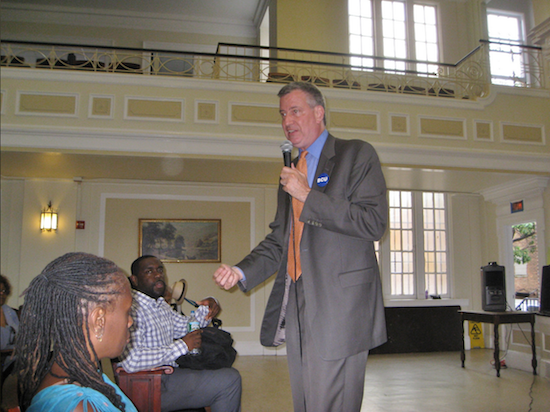
OPINION: Is de Blasio symbolic of a new nationwide trend?

Since the victory of Brooklyn Democrat Bill de Blasio at the polls, many among both his friends and his enemies have said his emergence means a victory of the left, or a victory of progressives.
I’m not sure this can be seen that way. Despite his youthful flirtation with radicalism (something he shares with, among others, President Obama and former President Clinton), his positions aren’t really the same as those of committed ideological leftists, such as the Green Party or Occupy Wall Street. Indeed, when you read hard-core left-wing sites, they’re often critical of de Blasio, citing, among other things, his support of the Clintons. Indeed, the little-known candidate Sal Albanese, a former Bay Ridge councilman, was further to the left than de Blasio.
Instead of a leftist, I would call de Blasio a traditional, old-fashioned left-liberal in the model of Mayor LaGuardia, Hubert Humphrey and Robert Kennedy. In most other industrialized countries, and indeed in the U.S. before, say, 1975, de Blasio would not be considered anything out of the ordinary. It’s only in the U.S., and particularly in New York, where the public faces of the Democratic Party have been people like Ed Koch, Mark Green and Christine Quinn, where de Blasio is perceived as “different.”
What is it that gives de Blasio his reputation as being a maverick? Simply, his willingness to challenge the “powers that be” in many situations. In Brooklyn, the best-known example of this is, of course, his fight to save Long Island College Hospital. Other candidates may have shown up at one or two rallies, but de Blasio showed up at almost every rally and, in his capacity as public advocate, initiated court action after court action.
Also pertinent were his very public criticism of the NYPD’s stop-and-frisk procedures, as they evolved under the Bloomberg administration, and his opposition to “co-locating” charter schools within regular public schools. By contrast, Chris Quinn was extremely timid when it came to criticizing the Bloomberg Administration.
De Blasio hasn’t always taken anti-establishment stances, by any means. He was not one of the opponents of the Atlantic Yards project during the days when his ally Letitia James was criticizing it constantly. But his victory means that at least some of the time, neighborhood activists and grass-roots efforts will have a chance of winning conflicts with entrenched political bureaucrats, high finance and mega-developers.
Under Mayor Bloomberg, by contrast, the city administration almost always took the side of powerful, entrenched institutions. The only fights Bloomberg picked were safe ones, with gun manufacturers, beverage companies and tobacco companies whose headquarters were thousands of miles away.
The political discourse of the last 40 years has been that while Republicans have loudly proclaimed their conservatism and move further and further to the right, Democrats have, like cowards, tried to appear as mild, moderate and “reasonable” as possible. Their behavior reminds one of the small kid in the playground who hopes that if he acts a certain way, the local bully will think, “Hey, he’s a regular guy after all!” and leave him alone. Hopefully, the election of de Blasio marks a reversal of that trend.
Leave a Comment
Leave a Comment

